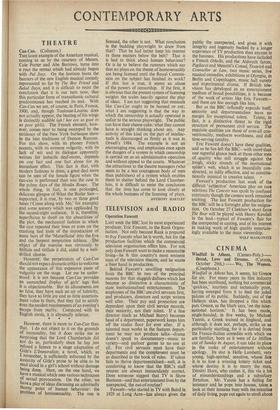CONTEMPORARY ARTS
THEATRE
This latest example of the American musical, coming to us by the courtesy of Messrs. Cole Porter and Abe Burrows, turns into a rout the retreat which had already begun with Pal Joey. On the horizon loom the banners of the new English musical comedy represented so far by The Boy Friend and Salad Days, and it is difficult to resist the conclusion that it is our turn now, that this particular form of transatlantic cultural predominance has reached its end. With Can-Can we are, of course, in Paris, France, 1900, and, though Toulouse-Lautrec does not actually appear, the beating of his wings is distinctly audible (ah ! hee ees so goot to us poor girls). The French element, how- ever, comes near to being swamped by the stridency of the New York burlesque show in the best traditions of Damon Runyon. For this show, with its phoney French accents, with its extreme vulgarity, with its lack of wit and its dialogue apparently written for imbecile deaf-mutes, depends on one fact and one fact alone for its immediate effect. This fact is that, with modern fashions in dress, a great deal more can be seen of the female figure when the can-can is performed than was the case in the palmy days of the Moulin Rouge. The whole thing, in fact, is one prolonged, delicious glimpse of What the Butler Saw— supported, it is true, by two or three good tunes ('Come along with Me,' for example) and some scenery which was applauded by the second-night audience. It is, therefore, superfluous to dwell on the absurdities of the plot, the mechanical fashion in which the cast repeated their lines or even on the crashing bad taste of the introduction of some bars of the `Marseillaise' into the Eve and the Serpent temptation tableau. The object of the exercise was obviously to titillate and titillate it did, aided by a well- drilled chorus.
However, the perpetrators of Can-Can should not expect dramatic critics to welcome the appearance of this expensive piece of vulgarity on the stage. Let me be under- stood: it is not because Can-Can provides an unmatched display of girls' legs that it is objectionable. But its allurements are so false, they have such an air of lubricity, they have so little joy and so little entertain- ment value in them, that they fail to satisfy even the modest requirements of an evening's escape from reality. Compared with its English rivals, it is abysmally inferior. • « However, there is more to Can-Can than that. I do not object to it on the grounds of immorality, but it does strike me as surprising that the Lord Chamberlain did not do so, particularly since he has just refused a licence to a stage adaptation of Gide's L'Immoraliste, a novel, which, as I remember, is sufficiently informed by the austerity of Gide's prose to be able to be read aloud in a girl's school without damage being done. Here, on the one hand, we have a musical which uses various techniques of sexual provocation. On the other, we have a play of ideas discussing an admittedly thorny point of human behaviour: the problem of homosexuality. The one is
-- -
licensed, the other is not. What conclusion is the budding playwright to draw from that? That he had better keep his interest in these matters below the belt? That it is bad to think about human behaviour? Or is he to believe the rumours which say that no plays on the theme of homosexuality are being licensed until the Royal Commis- sion on the subject has finished its work? If this last is true, it seems an abuse of the powers of censorship. If the first, it is obvious that the present system of licensing weights the scales heavily against the play of ideas. I am not suggesting that musicals like Can-Can ought to be banned or cut; what I am suggesting is that the way in which the censorship is actually operated is unfair to the serious playwright. The public can have their cheese-cake: what they cannot have is straight thinking about sex. Any activity of this kind on the part of intellec- tuals is discouraged as firmly as it was in Orwell's 1984. The example is not an encouraging one, and emphasises once again the dangers of a system in which censorship is carried on as an administrative operation and without appeal to the courts. Whatever the attractions to the theatre managers (who seem to be a less courageous body of men than publishers) of a system which enables them to shelter behind the Lord Chamber- lain, it is difficult to resist the conclusion that the time has come to look closely at the whole business of the licensing of plays.
ANTHONY HARTLEY


































 Previous page
Previous page